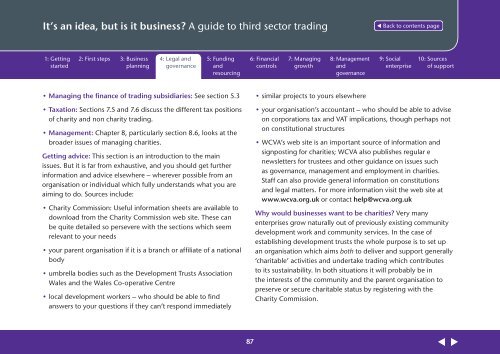A guide to third sector trading - WCVA
A guide to third sector trading - WCVA
A guide to third sector trading - WCVA
You also want an ePaper? Increase the reach of your titles
YUMPU automatically turns print PDFs into web optimized ePapers that Google loves.
It’s an idea, but is it business? A <strong>guide</strong> <strong>to</strong> <strong>third</strong> sec<strong>to</strong>r <strong>trading</strong><br />
1: Getting<br />
started<br />
2: First steps 3: Business<br />
planning<br />
4: Legal and<br />
governance<br />
5: Funding<br />
and<br />
resourcing<br />
6: Financial<br />
controls<br />
7: Managing<br />
growth<br />
8: Management<br />
and<br />
governance<br />
9: Social<br />
enterprise<br />
10: Sources<br />
of support<br />
• Managing the finance of <strong>trading</strong> subsidiaries: See section 5.3<br />
• Taxation: Sections 7.5 and 7.6 discuss the different tax positions<br />
of charity and non charity <strong>trading</strong>.<br />
• Management: Chapter 8, particularly section 8.6, looks at the<br />
broader issues of managing charities.<br />
Getting advice: This section is an introduction <strong>to</strong> the main<br />
issues. But it is far from exhaustive, and you should get further<br />
information and advice elsewhere – wherever possible from an<br />
organisation or individual which fully understands what you are<br />
aiming <strong>to</strong> do. Sources include:<br />
• Charity Commission: Useful information sheets are available <strong>to</strong><br />
download from the Charity Commission web site. These can<br />
be quite detailed so persevere with the sections which seem<br />
relevant <strong>to</strong> your needs<br />
• your parent organisation if it is a branch or affiliate of a national<br />
body<br />
• umbrella bodies such as the Development Trusts Association<br />
Wales and the Wales Co-operative Centre<br />
• local development workers – who should be able <strong>to</strong> find<br />
answers <strong>to</strong> your questions if they can’t respond immediately<br />
• similar projects <strong>to</strong> yours elsewhere<br />
• your organisation’s accountant – who should be able <strong>to</strong> advise<br />
on corporations tax and VAT implications, though perhaps not<br />
on constitutional structures<br />
• <strong>WCVA</strong>’s web site is an important source of information and<br />
signposting for charities; <strong>WCVA</strong> also publishes regular e<br />
newsletters for trustees and other guidance on issues such<br />
as governance, management and employment in charities.<br />
Staff can also provide general information on constitutions<br />
and legal matters. For more information visit the web site at<br />
www.wcva.org.uk or contact help@wcva.org.uk<br />
Why would businesses want <strong>to</strong> be charities? Very many<br />
enterprises grow naturally out of previously existing community<br />
development work and community services. In the case of<br />
establishing development trusts the whole purpose is <strong>to</strong> set up<br />
an organisation which aims both <strong>to</strong> deliver and support generally<br />
‘charitable’ activities and undertake <strong>trading</strong> which contributes<br />
<strong>to</strong> its sustainability. In both situations it will probably be in<br />
the interests of the community and the parent organisation <strong>to</strong><br />
preserve or secure charitable status by registering with the<br />
Charity Commission.<br />
87












